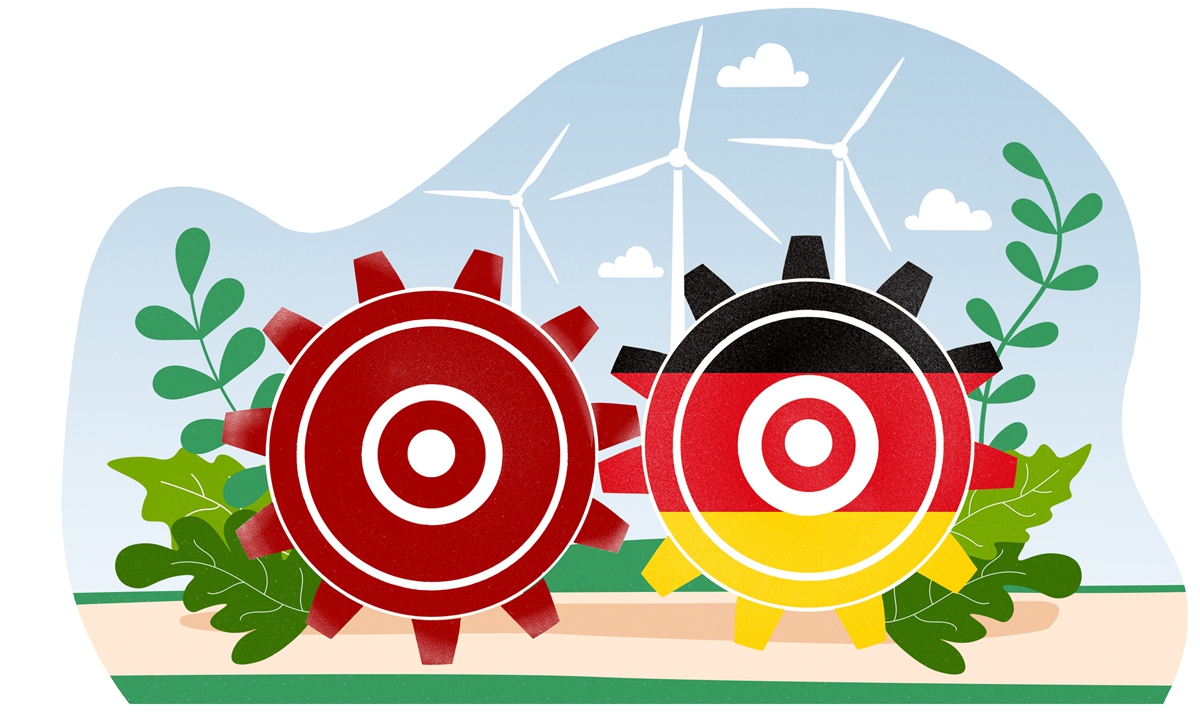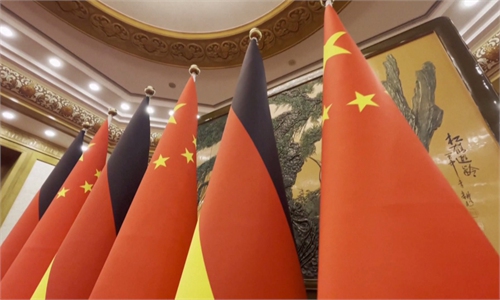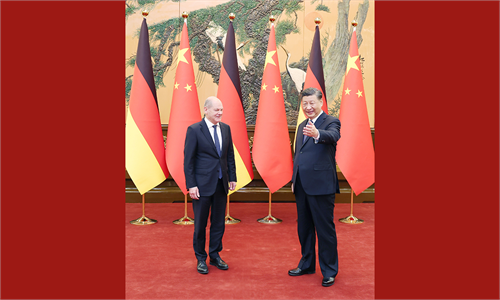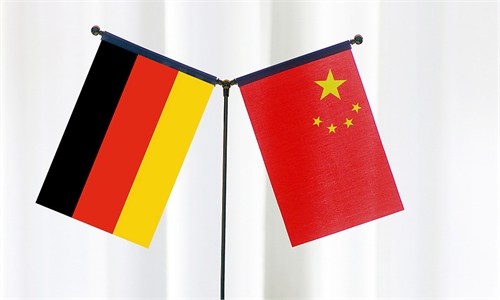
Illustration: Chen Xia/Global Times
As the first visit by a G7 leader to China in about three years, German Chancellor Olaf Scholz might be impressed with two things in Beijing - the warmth of his hosts and the Chinese people, and the beautiful sunshine greeting him on Friday that shows the Chinese government's unrelenting anti-pollution efforts have borne tangible results.
As the world's second and fourth largest economies, China and Germany share a coterie of responsibilities, such as facilitating global economic recovery from the pandemic and geopolitical headwinds, fighting rising global inflation by maintaining free trade and industrial supply chain stability, while cooperating more closely to combat climate change and atmospheric pollution by curbing carbon emissions.
The two countries have every reason to continue to be good partners, bent on building on their past experiences and successes attained through years of goodwill cooperation. Scholz's predecessor, Angela Merkel, has won great acclaim and wide respect in China for her far-sightedness, charisma and independence in policy-making and leading Germany through treacherous waters from 2005 to 2021. A true stateswoman, she steered Germany to overcome the 2008-09 global financial crisis, and led Germans to unprecedented prosperity.
Merkel is a strong advocate of keeping closer economic ties with China. As chancellor, she visited this country a dozen times trekking to many Chinese cities, talking to local residents and getting first-hand knowledge and impression of China and its distinct culture. Merkel knows what China's huge potential is and where this country is headed for. Now, Scholz, as Germany's new chancellor, has visited China for the first time, and he is welcome to drop on Chinese cities frequently.
Prior to Scholz's plane arriving in Beijing on Friday, some in the US and the West asked a sinister question that "how serious Germany is about reducing its economic dependence on China." Even the junior Green Party partners in Scholz's coalition government seemed to mimic the Biden administration and asked to "decouple" from China.
It is true that the current US government, for the purpose of prolonging the US' unipolar hegemony and containing China's meteoric economic rise in the world, has ramped up a selfish campaign to strictly restrict China's access to US-based semiconductor-related technology. But as the former Trump administration's historic tariff war against China has categorically failed, causing a vicious cycle of consumer price rises and severe inflation in the US, the Biden administration's technology war will collapse too. The endpoint is that without China's huge market, US-based microchip plants will largely wither and fall apart.
The market will have the ultimate say in how business is done - this has been proved by hundreds of multinational corporations investing and trading in China. Just ask Toyota, Airbus, Apple and Tesla.
The close integration of Chinese and German businesses in the past many years has shored up both economies and enriched both peoples, definitely not making German economy "more vulnerable" as claimed by some US and Western politicians and opinion pundits.
It is not very difficult for Scholz and his fellow Social Democrats to separate the truth from lies. Deep trade ties bind Europe and Asia's biggest economies, with steadily rising Chinese consumers' demand for German cars, machinery and chemicals, which fueled Germany's prosperity in the past two decades.
China's economy, growing 3.9 percent in the third quarter, is estimated to expand by at least 4 percent in the fourth quarter. China's economy may rise by more than 5 percent in 2023 if the COVID-19 flare-ups are effectively curbed. China will remain unrivaled in terms of market size and newly-created growth opportunities for many German companies. So, trying to decouple from a dynamic and huge market like China's is simply folly.
The two economies are highly complementary. China is the largest market in the world for German auto manufacturers because Chinese consumers love high-quality German cars. China made up 40 percent of Volkswagen's global deliveries in the first three quarters this year, and it's also the top market for Mercedes Benz and BMW vehicles. Meanwhile, Germany imported many electronic products from China, including 70 percent of imported smartphones and 80 percent of imported laptops, according to media reports.
Scholz penned an op-ed article on the eve of his Beijing visit, defending his trip to China. The "significant amount of trade" between the two countries and between China and EU countries has made "China, Germany and Europe benefit equally", he wrote.
At present, Germany is grappling with a string of economic challenges, including an elevated double-digit inflation, an acute energy crisis, and a sputtering economy on the verge of hurtling toward a deep recession. To make things worse for Germany and the broader EU, the US is taking advantage of the Ukraine-Russia conflict and the extreme shortage of natural gas there by exporting LNG to Europe at a price four times that in the US. What the US government seeks is to lure European factories to the US and therefore weaken the EU, making it a permanent junior partner and a servant to Washington.
Now is an important and also perplexing time for policymakers worldwide. China has voiced a loud "no" to de-globalization forces in the US who renege on free trade and economic integration. Germany and China, having benefited greatly from close economic cooperation and partnership, should join hands to mitigate and blunt the "decoupling" headwind in the world.
The author is an editor with the Global Times. bizopinion@globaltimes.com.cn



